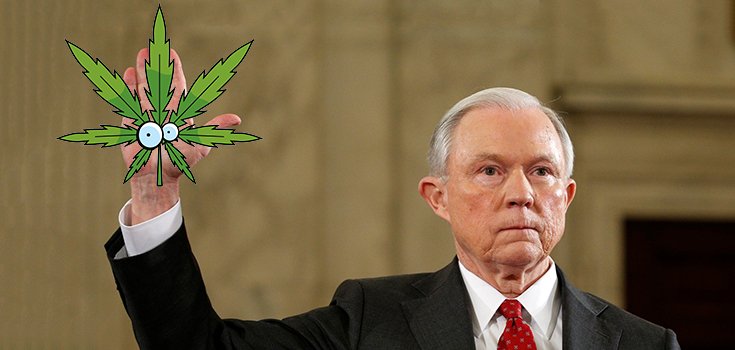Jeff Sessions Wants to Crack Down on Medical Marijuana Users

When Donald Trump appointed Jefferson Beauregard Sessions III as U.S. Attorney General, marijuana users and advocates immediately got nervous because of Sessions’ hatred for pot and his near-obsession with tightening drug laws. Now, it seems, those fears may become reality, as it has been revealed that the nation’s top law enforcement official personally asked Congress to allow him to undo federal medical marijuana protections that have been in place since 2014. [1]
His request was made known in a May 2017 letter that became public on June 12, 2017.
The Rohrabacher-Farr Amendment, as the protections are called, prohibits the Justice Department from using federal funds to bar states “from implementing their own State laws that authorize the use, distribution, possession or cultivation of medical marijuana.”
In the letter, Sessions argues that the amendment would “inhibit [the Justice Department’s] authority to enforce the Controlled Substances Act,” under which marijuana is a Schedule I drug. He added:
“I believe it would be unwise for Congress to restrict the discretion of the Department to fund particular prosecutions, particularly in the midst of an historic drug epidemic and potentially long-term uptick in violent crime. The Department must be in a position to use all laws available to combat the transnational drug organizations and dangerous drug traffickers who threaten American lives.” [1]

The “historic drug epidemic” Sessions refers to revolves around opioid painkillers, not marijuana. Either Sessions refuses to look at recent studies or he refuses to believe them, because in states where medical marijuana is legal, opioid use decreases.
In one study, published by the U.S. Natural Library of Medicine National Institutes of Health (the government!), researchers demonstrated that cannabinoids can make addiction to cocaine, amphetamines, and other damaging drugs easier to treat.
All of this research seems to suggest that cracking down on medical marijuana laws would make the opioid problem worse.
John Hudak of the Brookings Institute calls Sessions’ arguments a “scare tactic” that:
“… could appeal to rank-and-file members or to committee chairs in Congress in ways that could threaten the future of this Amendment.” [1]

But medical marijuana advocates have one very important thing on their side: The fact that the Rohrabacher-Farr amendment has significant bipartisan support in Congress.
Plus, voters overwhelmingly support medical cannabis. According to a survey by Yahoo News and The Marist Poll published in April 2017, 83% of those surveyed said that they approve of legalizing marijuana for medical treatment. A Quinnipiac poll published in the same month found that 94% of U.S. voters support medical cannabis.
In the letter, Sessions also referred to “significant health effects” caused by smoking marijuana. He referenced the National Institute on Drug Abuse’s (NIDA’s) list of health risks associated with weed, including:
“… an increased risk of psychiatric disorders such as psychosis, respiratory ailments such as lung infections, cognitive impairments such as IQ loss, and substance use disorder and addiction.” [2]
However, even the Drug Enforcement Agency (DEA) has chosen to rely on research versus fear-mongering and spreading myths. In early 2017, the agency removed several misleading claims from its website in response to a legal petition filed by a nonprofit pro-marijuana group. While the DEA did not remove every myth and falsehood, it did remove the following deceptions:
- Smoking marijuana causes head, neck, and lung cancer
- Cannabis causes psychosis
- Marijuana is a precursor to illicit drug use and heroin addiction
President Trump said during his campaign that he supported state marijuana laws. But when the Rohrabacher-Farr Amendment was recently extended by Congress through September 30, Trump issued a signing statement noting he would “treat this provision consistently with my constitutional responsibility to take care that the laws be faithfully executed,” suggesting that he could potentially undermine the policy. [2]
Sources:
[2] Newsweek
